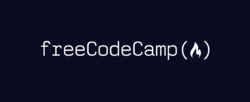FreeCodeCamp: Difference between revisions
Restore Infobox that was accidentally deleted; move amount of money saved |
No edit summary |
||
| Line 1: | Line 1: | ||
<!-- Please do not remove or change this AfD message until the issue is settled --> |
|||
<!-- The nomination page for this article already existed when this tag was added. If this was because the article had been nominated for deletion before, and you wish to renominate it, please replace "page=FreeCodeCamp" with "page=FreeCodeCamp (2nd nomination)" below before proceeding with the nomination. |
|||
-->{{Article for deletion/dated|page=FreeCodeCamp|timestamp=20170127071742|year=2017|month=January|day=27|substed=yes}} |
|||
<!-- Once discussion is closed, please place on talk page: {{Old AfD multi|page=FreeCodeCamp|date=27 January 2017|result='''keep'''}} --> |
|||
<!-- End of AfD message, feel free to edit beyond this point --> |
|||
{{lowercase title}} |
{{lowercase title}} |
||
{{Infobox organization |
{{Infobox organization |
||
Revision as of 07:17, 27 January 2017
An editor has nominated this article for deletion. You are welcome to participate in the deletion discussion, which will decide whether or not to retain it. |
 | |
| Formation | October 2014 San Francisco, California |
|---|---|
Region | Worldwide |
Volunteers | > 551[1] |
| Website | www |
freeCodeCamp is an open-source community that runs a free online web development course and teaches students to code in several languages, then partners them with nonprofit organizations to provide mutually beneficial web development. It was launched in October 2014 by Quincy Larson.
Curriculum
The self-paced curriculum[2] involves 1,200 hours of interactive coding challenges and web development projects, plus 800 hours of contributing to open-source[3] projects for nonprofits and is constantly expanded by more challenges and projects. This translates into about one year of full-time coding. The curriculum is divided into Front-End Development, Data Visualization, and Back-End Development. Participants receive a certificate after completing each of the three sections.
Another focus in the curriculum is pair programming. Pair programming in freeCodeCamp helps cultivate a culture of collaboration and shared learning, which can overcome doubts in a student's skills.[4] This kind of peer learning was also emphasized because of the frustrations the founder of freeCodeCamp experienced when learning to program himself and found that pair programming accelerated his learning.[5]
The languages and technologies currently taught by freeCodeCamp include HTML 5, CSS 3, JavaScript, jQuery, Bootstrap, Sass, React.js, Node.js, Express.js, MongoDB, and Git.[6]
Nonprofit Work
As students of freeCodeCamp finish all four certificates of the curriculum, they get the opportunity to work with nonprofit organizations. An Indonesia-based nonprofit, Kopernik, is one of the organizations that has benefited from collaborating with freeCodeCamp.[7] People Saving Animals is another nonprofit that has worked with a freeCodeCamp graduate.[7] freeCodeCamp has donated US$ 1,400,000[8] worth of development work to nonprofits as of January 2017.
Reception
freeCodeCamp's platform is used by about 350,000 unique visitors per month.[9][10] In terms of the amount of web traffic on the site according to Alexa, freeCodeCamp is ranked around 4,500 globally and around 2,200 in the United States.[11]
Students are organized in more than 1,500 local study groups (known as Campsites) around the world.[12] Typical coding bootcamps may gear their students to particular industry skills, but students in freeCodeCamp gain all-around proficiency through all the projects they build.[13]
References
- ^ freeCodeCamp's main repository of contributors with additional volunteers in chat rooms and forums, retrieved 2017-01-23.
- ^ freeCodeCamp's map of challenges, retrieved 2017-01-08.
- ^ Michael D. Johnson, Open Source for Good, retrieved 2017-01-08.
- ^ Finley, Klint (June 18, 2015). "You Can Do Real-World Work at This Free Coding Boot Camp". Wired. Retrieved January 1, 2017.
- ^ Eadicicco, Lisa (November 14, 2014). "A Programmer Describes How He Nearly Went Insane Learning How To Code, And How To Avoid His Mistakes". Business Insider Australia. Retrieved January 24, 2017.
- ^ freeCodeCamp's map of challenges, retrieved 2017-01-13.
- ^ a b "Employers Are Crowdsourcing Coding: Here’s Why", retrieved 2017-01-24
- ^ "freeCodeCamp's statistics page". Retrieved January 8, 2017.
- ^ Tweet by Quincy Larson, founder of freeCodeCamp, showing website analytics for the end of December 2016, retrieved 2017-01-10.
- ^ Quincy Larson, How to get published in the freeCodeCamp Medium publication, retrieved 2017-01-12
- ^ "freecodecamp.com Traffic Statistics", retrieved 2017-01-24.
- ^ freeCodeCamp City Based Local Groups, retrieved 2017-01-08.
- ^ "Coding bootcamp offers students real-world experience", retrieved 2017-01-24.
